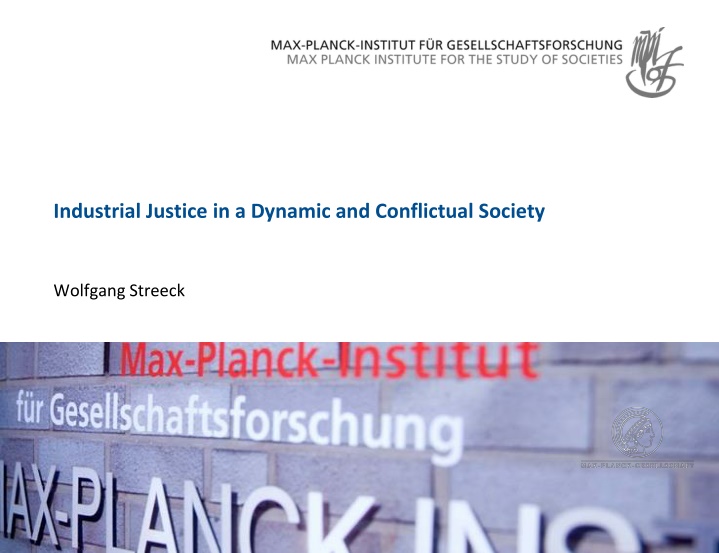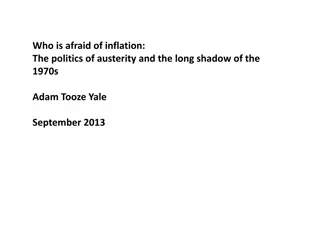
Labor Law Dynamics in Conflictual Societies
Explore the intricate nature of labor law in societies with conflicting interests, where regulations aim to establish social justice by balancing employer and worker rights. Learn how labor law functions as both formal state law and social law, addressing not only legal consistency but also substantive justice in the workplace.
Download Presentation

Please find below an Image/Link to download the presentation.
The content on the website is provided AS IS for your information and personal use only. It may not be sold, licensed, or shared on other websites without obtaining consent from the author. If you encounter any issues during the download, it is possible that the publisher has removed the file from their server.
You are allowed to download the files provided on this website for personal or commercial use, subject to the condition that they are used lawfully. All files are the property of their respective owners.
The content on the website is provided AS IS for your information and personal use only. It may not be sold, licensed, or shared on other websites without obtaining consent from the author.
E N D
Presentation Transcript
Industrial Justice in a Dynamic and Conflictual Society Wolfgang Streeck
On the nature of (classical) labor law (I) (1) Labor law constitutes a social (political) regime (actors in institutions) in the labor market and at the workplace, to regulate cooperation between actors with conflicting interests (employers and workers), on terms that satisfy minimum social standards of justice. Rather than simply enabling buyers and sellers of labor to exchange work for pay, labor law is not indifferent to the nature of the work being bought and sold: it wants it to be not just any work but decent work. (It tries to prevent contracting for indecent work.) (2) Labor law is at the same time formal (state) law and social law, law from above and from below (participatory law), law-on-the-books and living law. Unlike contract law pure and simple, labor law is not just concerned with its formal (dogmatic) consistency and pragmatic predictability, but also with the substantive justice of the contracts it regulates. It aims to facilitate productive cooperation between employers and workers (capital and labor), but only on terms that are normatively acceptable to society as a whole. 2
On the nature of (classical) labor law (II) (3) Labor law in a capitalist economy regulates how labor power (work) is traded as a commodity, with the performance bought and sold and its price being stipulated in a contract. Classical labor law, being social rather than just commercial law, treats labor power as an imperfect commodity. Unlike selling a car or a banana, selling labor requires the seller to spend some of her limited (life-) time with the buyer as he uses the work he has paid for, following orders in a hierarchical relationship (after selling a car or a banana, you can go home and watch TV). (4) In contract law pure and simple, contracts are seen as voluntary agreements among equals, freely entered into by the contracting parties. To the extent that contracts are not signed under duress, they are considered fair, and their terms are considered just. However, in classical labor law, contracts for work, unless regulated by society and the legal system, are not per se equal, the reason being that buyer and seller belong to different classes, with the former able to dictate the terms of the contract to the latter. 3
Labor law and asymmetrical class power (I) Asymmetries in (class) power between capital and labor exist in two respects: In the market for labor: more workers than employers, higher urgency In the organization of work (the labor process): labor as cost factor for employer talking the residual , using hierarchical authority to change the wage- effort bargain in his favor ( innovation , new combinations of production factors ). Classical labor law assumes that, in order for employment contracts to be fair, and their terms just, collective institutions are needed that make the power distribution between sellers and buyers more equal. This is to secure acceptance for the terms of contracts as minimally just, as required for functional reasons: to secure political stability and economic cooperation across the class divide, and for normative reasons: to civilize labor markets and work relations. 4
Labor law and asymmetrical class power (II) To this end, classical labor law provides, in addition to contracts between individuals, also for contracts between collectives (collective as distinguished from individual labour law). It empowers organizations of workers (trade unions) and employers (employer associations) to negotiate collective contracts (collective agreements) authoritatively regulating the individual contracts into which their members may enter. This, together with relevant state law, is to balance the asymmetrical distribution of power between the contracting parties. Licensing quasi-public collective intervention in private individual contracting is to make contracting for work more egalitarian and its results more voluntarily acceptable, by biasing outcomes in favor of the economically weaker party. In this sense labor law is also constitutional law: it constitutes a system of institutions and actors charged with functions of governance. The purpose is to turn class conflict into class cooperation, by imposing limits on what the stronger party in the market and at the workplace can demand. 5
Labor law and industrial justice Industrial justice (decent work) is a normative issue not settled by economic calculation. It is also an empirical issue where the norm is subject to change as real opportunities for material progress arise (including political adjustment of markets and organizational hierarchies to social demands rather than vice versa), depending on Technical possibilities Economic conditions; market opportunities and constraints Political windows of opportunity Power relations between capital and labor: trade union power raising level of aspirations of workers Social norms, cultural development (family structures) 6
Labor law and industrial democracy On the ground, in local and sectoral labor markets and at the workplace, classical labor law used to institute, or to support, monitoring and enforcement mechanisms often included under the concept of industrial democracy. They made it possible to adapt the general rules regulating labor markets and the labor process to specific and often highly diverse local conditions, as well as processing grievances over them and thereby reducing the caseload of labor courts and tribunals. They also served as feedback mechanisms informing rule-makers in industrial relations and in government on emerging needs to amend rules that caused conflict rather than encouraged cooperation. Institution-building incorporating extant sociability among workers (worker collectivism) at the workplace 7
Labor law and industrial change (I) Labor law (substantive and procedural) is permanently contested and under pressure to change (adjust, develop). It deals with highly dynamic conditions: Technical progress, as driven by employers seeking improvements in productivity ( labor process ) Changing labor supply and demand, resulting in changes in relative market wages and market power Evolving social structures, given rise to changing needs of workers with respect to the intersection of work and non-work ( work-life balance ) To remain relevant in markets for labor and hierarchies of production, labor law must, even more than other law, be living law, both as state law and quasi-public (semi-private) law, with respect to substance as well as to institutions. 8
Labor law and industrial change (II) Labor law must be more than dogmatically or systematically coherent. Above all, it must be openon the ground for autonomous norm-setting in collective bargaining and industrial democracy if it is to generate settlements between capital and labor that are legitimate enough to engender cooperation in good faith between actors with different interests. Labor law is this sense is empiricist and experiential rather than, or in addition to, dogmatic: it must be able to cope with a wide variety of ever new legally relevant phenomena. > Collective settlements in classical labor law are for this reason typically temporary, not to last forever. They are made only for a limited time, after which they have to be renewed, to adjust their terms and those of individual contracts to changing economic, technological, and social conditions (in classical labor law: to arising opportunities for social progress). 9
On the accommodating nature of labor law institutionalism (I) Historically, worker collectivism the inclination of workers to organize and act as one precedes the legal recognition of trade unions. Institutional accommodation of worker collectivism modifying liberal (individualistic) contract law was based on a realistic insight: that you could not suppress it unless under very specific conditions and with potentially destructive effects. > Labour law is both normative and realistic (pragmatic), not trying to impose a liberal normative order (individual contracting) where it does not fit (where it is rejected). Instead it tries to institutionalize social collectivism into make contracting for work more equitable and more generally legitimate. 10
On the accommodating nature of labor law institutionalism (II) Another example is the right to strike. Going on strike is the strongest possible expression available to workers of their sense of justice being violated. By striking workers mark the minimum terms of contract for which they are willing to cooperate. Striking workers temporarily fire their employer, analogous to employers firing or not hiring workers too demanding by employer standards. Classical labor law, intent on providing for fair contracting and decent work, not just allows workers to breach a valid contract. It also prevents employers from hiring replacements, which enables workers to deprive employers not just of their cooperation, but of worker cooperation as such. > Realism again: Classical labor law recognizes that the state and the law cannot force workers to go to work (that they cannot in practice lock up a multitude of workers for forcibly suspending the employer s or other workers freedom of contract. Labor law respects strikes both because it has no choice and because the right to strike helps balance the power relation between capital and labor. 11
Industrial Justice in a Dynamic and Conflictual Society Wolfgang Streeck

